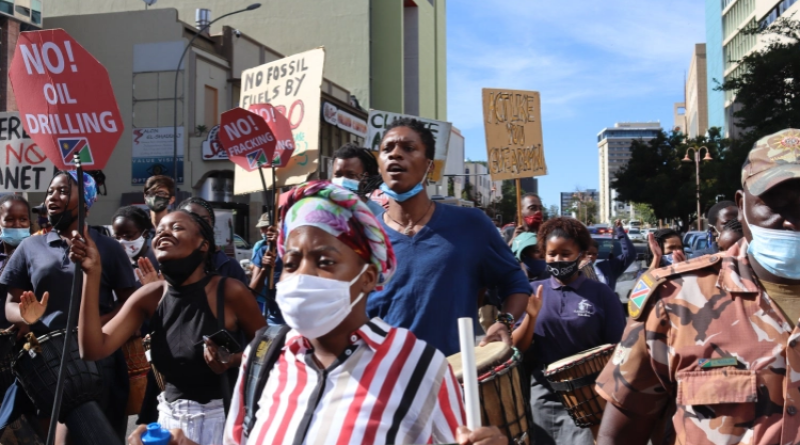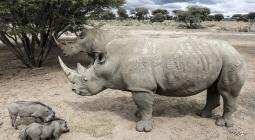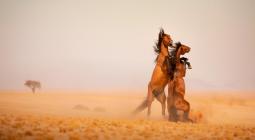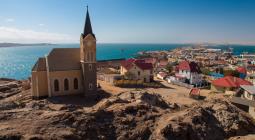Namibia: Indigenous leaders want big oil out of Kavango Basin.

ReconAfrica believes the Kavango Basin in Namibia and Botswana could generate billions of barrels of oil, but environmentalists and Indigenous leaders want the area to remain untouched.
Windhoek, Namibia – The Okavango Delta is home to some of the world’s most threatened species, including endangered African wild dogs and cheetah, white rhinoceros, black rhinoceros, and lions.
The delta – a World Heritage site recognised by the United Nations Educational, Scientific and Cultural Organization – is also pivotal to the water supply for the Kalahari Desert, and its unique ecosystems draw large numbers of tourists eager to explore its biodiversity each year. The region holds sacred meaning for the San, an Indigenous group that is considered one of the original inhabitants of the Southern African region.
“The Kalahari means to the San people what Mecca means to Muslims,” Q7 Beckett, an Indigenous youth leader, told Al Jazeera. “It’s more than our home and more than a pilgrimage – it’s our identity. We live off this land.”
But they fear that land could be under threat after a Canadian petroleum exploration company was granted a licence by the Namibian Ministry of Mines and Energy to explore the Kavango Basin, a region that spreads across the northeast part of Namibia as well as the northwest part of Botswana.
In January, Reconnaissance Energy Africa (ReconAfrica) started drilling on the first of three wells, stating on its website that the firm “believes the Kavango Basin is another world class Permian basin, analogous to the Permian basin in Texas”, capable of generating billions of barrels of oil.
On April 15, ReconAfrica announced the first well had provided “clear evidence of a working conventional petroleum system in the Kavango Basin”, adding it now plans to start work at its second well. The company holds licences comprising approximately 3.4 contiguous hectares (8.5 million acres).
The Namibian government has said oil and gas exploration will be conducted in an “environmentally sustainable manner”, Maggy Shino, petroleum commissioner at the Namibian Ministry of Mines and Energy, told Al Jazeera in a statement, adding that if oil were found, it could lead to the creation of “employment opportunities” as well as lessen the country’s “dependence on the import of oil and gas”.
But environmentalists and community leaders fear the oil industry could permanently change the Kavango Basin.
The drilling of the boreholes for oil exploration can threaten the ecosystem through potential oil spillage, noise pollution and water contamination, said Jan Arkert, a South African-based engineering geologist with the firm Africa Exposed Consulting Engineering Geologists.
“Even during this first phase, we don’t know how they are going to dispose of their wastewater,” Arkert told Al Jazeera.
But ReconAfrica said on its website that there will be no damage to the ecosystem and that its sites are not located in the area of national parks, conservancies or World Heritage sites. The firm said it “will follow global best practices and local regulations in all drilling and reclamation activity”.
Community concerns
ReconAfrica engaged in public consultations throughout January after community members and environmental activists expressed concerns about the project. But some local communities feel they were not sufficiently included in the decision-making process.
Max Muyemburuko, the chairperson for Kavango East and West Regional Conservancy and Community Forestry Association, told Al Jazeera that ReconAfrica met with only one of three traditional authorities in the area, and his community was only informed about the project after work on it had started.
“They didn’t go through with the normal process of doing business in our communities, where you have to meet with headmen and chiefs of all the communities that will be affected first,” Muyemburuko said.
On January 22, Muyemburuko attended one of the consultations in Rundu in Kavango East with governors, headmen, representatives of non-profit organisations and politicians.
But, he said, the meeting was not translated into the local language.
“It was a one-man show,” he said. “No question was properly answered.”
But a ReconAfrica spokesperson told Al Jazeera: “Detailed consultation with local communities and a range of other stakeholders, including the traditional authorities regarding land use, was carried out. This was completed in March 2020 and since then we have attempted to keep an active and collaborative relationship in place with all interested parties.”
Conservation campaign
Environmentalists and community leaders want to see the area preserved. They have teamed up to raise awareness about the matter. A campaign called #SavetheOkavangoDelta was started by Fridays for Future Windhoek and Frack Free Namibia and Botswana, two local environmentalist groups.
A protest was organised in Windhoek, the capital, the week before the drill rig arrived in December. Due to COVID-19 pandemic restrictions, most other efforts have been organised online. An online petition appealing to the governments of Namibia and Botswana has garnered more than 150,000 signatures.
“Who gave the government the right to determine the destiny of Indigenous communities? This is just another case of environmental racism,” Ina-Maria Shikongo, the founder of Fridays for Future Windhoek, told Al Jazeera.
“My worst fear is that it could turn into a new Niger Delta,” Shikongo added, referencing the ongoing fight to clean up areas polluted by oil companies there.
Beckett worries that drilling could further marginalise the San people, in part by jeopardising the tourism industry they depend on financially.
“Indigenous people usually sell arts and crafts to tourists or are invited by farms to come and dance and tell stories for the tourists,” Beckett said. “If the animals leave this area, tourism will take a hit. The Okavango Delta means income and development. Our entire livelihood could be affected.”
Muyemburuko is particularly worried about the impact of the industry on the area’s water supply.
“ReconAfrica will need a lot of water and as you know, Namibia is a dry country,” Muyemburuko explained. “As we depend on farming, if we don’t have water, our livelihoods will be endangered. We’re worried about water and air pollution, too. We just don’t want the environment we live in to be harmed.”
Fracking fears
ReconAfrica and the Namibian Ministry of Mines and Energy have both said hydraulic fracturing, better known as fracking, is not part of the plan.
ReconAfrica’s spokesperson, Claire Preece, told Al Jazeera “There is no fracking in our programme, no horizontal wells, and very limited water usage such that the water wells will be turned over to the community.”
And in March, petroleum minister Shino issued a statement confirming “No licence to conduct fracking activities was granted to Reconnaissance Energy by the ministry and no such licence is being contemplated.”
But those assurances haven’t quelled environmentalists’ and Indigenous groups’ fears.
“Potential conventional and unconventional opportunities” were mentioned in a July 2020 research report from ReconAfrica that was the subject of press reports but has since been removed from the company’s website. A copy of the report was shared with Al Jazeera by Arkert, who remains sceptical about the company’s plans.
“Looking at the geological aspects – trying to tap into the so-called shale gas – and the commercial potential, this is definitely a fracking exercise if they [ReconAfrica] get permission from the Ministry of Mines and Energy,” Arkert said.
But Preece said that any estimation that the company’s project in the Kavango Basin was related to unconventional methods such as fracking “would be completely false”.
“Conventional oil and gas production uses vertical wells, no fracking and very little water. The Kavango is a new sedimentary basin and like all other hydrocarbon basins, conventional production is all that exists for roughly the first 20 years,” Preece explained. “Unconventional production is the last gasp of older basins. It is expensive, low-return and we would never take it forward to any investors as it is wildly un-economic.”
The Namibian government has also reassured activists that locations for the drillings are far from both the Okavango Delta and the Kavango River.
But for supporters of the #SavetheOkavangoDelta campaign, that is not enough. They want to see Namibia turn to renewable sources of energy instead of fossil fuels — and have continued to organise peaceful protests to try to make it happen.
22 April 2021
AL JAZEERA




